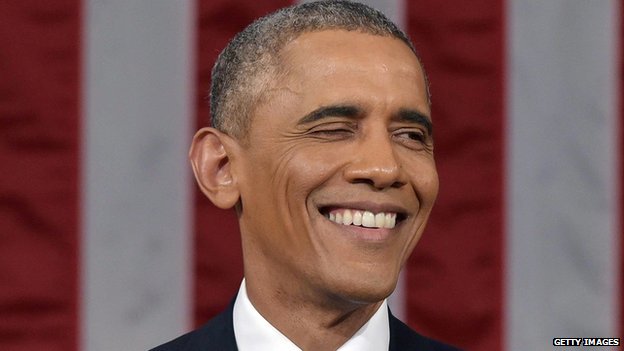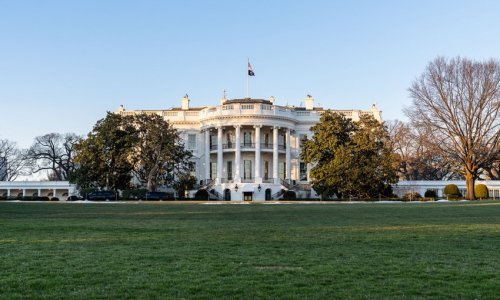On Tuesday night President Barack Obama faced a vexing challenge. How can he give a policy speech to a Congress that has little interest in what he has to say?
With the present effectively off the table, Mr Obama spent his time looking back - and forward.
Although the president said early in his 2015 State of the Union address that "tonight, we turn a page", it became obvious early on that he wasn't going to touch the book until he got in a few last words.
"America, for all that we've endured; for all the grit and hard work required to come back; for all the tasks that lie ahead, know this," he said, "the shadow of crisis has passed, and the State of the Union is strong."
The words "victory lap" were bandied about by numerous commentators, as the president basked in the glow of an economy that is showing signs of life and approval ratings that, albeit ever so slightly, are on the rise. And although all this is happening as Republicans take over both houses of Congress for the first time since 2007, it did little to darken his mood.
"He asserted that the brightening economic picture - including accelerating job growth, more people with health insurance and lower gas prices - had proved that he was right, and his adversaries misguided, all along," writes the Washington Post's David Nakamura.
Former Secretary of State Hillary Clinton.
"More than anything," says the Christian Science Monitor's Linda Feldmann, "the speech was a consummate display of political bravado."
It was an attitude that liberals enjoyed, but it left some conservatives grousing that the president's speech was more appropriate as "fantasy fiction for tweens", in the words of the New York Post columnist John Podhoretz.
"Politically, the page that turned in November 2014 was the page in which Democrats held majorities in legislatures," he writes. "The page didn't just turn - it was torn out of the book, crumpled up and tossed in the garbage bin."
CNN analyst Ruben Navarrette writes that the whole premise of the speech is "ridiculous".
"The president has just suffered a clear repudiation of his policies, and, instead of backing up and recalibrating his strategy for getting things done in a landscape that has changed dramatically, he's doubling down on his bet," he writes. "That's not leadership. It's hubris."
After painting a rosy picture of the nation's current condition, leavened with a few I told you so's, the president proceeded to launch into a more traditional State of the Union list of Democratic policy priorities - minimum-wage increases, addressing climate change, greater funding for education and tax reform that includes closing loopholes that benefit the wealthy.
He labelled his programme "middle-class economics", and said policies like these will "continue to work, as long as politics don't get in the way".
This, then, was the president's pivot to the future - his attempt to define terrain for the campaigns of 2016, when control of the presidency and both houses of Congress will be up to the voters.
"When Obama proposes progressive policies like these, he's playing a longer game - guiding Democrats on the Hill as they battle against Republican budgets, or laying out a menu of policies for his successor, who might have better luck with Congress," writes the New Republic's Brian Beutler.
He continues: "Seven years into Obama's presidency, the US economy is finally growing rapidly enough to boost his popularity and to sell the country on the idea that Obama's peculiar brand of ostentatious incrementalism - building out and improving existing institutions, directing resources through them to the middle class- has worked, and should serve as a beacon not just for liberals, but for conservatives aspiring to recapture the presidency."
Of course it's impossible to talk about 2016 presidential politics without acknowledging the looming presence of as-yet-unannounced-candidate Hillary Clinton. Given that she would be the prohibitive favourite for the Democratic nomination should she decide to run, was Mr Obama's speech a boost or a shot across the bow?
By proposing policies he has no hope of passing in this Congress, writes the Atlantic's David Frum, Mr Obama's "intent, pretty obviously, is to box in his presumptive successor as head of the Democratic Party".
"Almost as much as a Republican victory, a Clinton succession would punctuate the Obama presidency with a question mark," he writes. "Obama's highest priority over the next two years seems to be to convert that question mark into an exclamation point, to force Hillary Clinton to campaign and govern on his terms."
Bloomberg's Lisa Lerer and Margaret Talev say that the president's speech "gives a major boost" to members of the Democratic Party's populist wing, led by Massachusetts Senator Elizabeth Warren.
Even if Ms Warren doesn't run for president - and so far she's been adamant that she is not - Mr Obama's speech was a warning to Ms Clinton that she needs to watch her left flank during the primary voting.
Beutler says that talk of friction between Ms Clinton and Mr Obama are overblown, however. He notes that key members of the president's inner circle are quietly moving into the former secretary of state's incipient campaign.
Instead, he says, Mr Obama's speech is laying the groundwork for Ms Clinton's campaign - one that will address income inequality and the lack of wage growth.
Although a lot can happen in two years, it appears that both parties are acknowledging that the growing gap between the wealthy and the rest of US society resonates with the voting public. Ms Clinton has given speeches on the subject, and possible Republican presidential hopefuls Mitt Romney and Jeb Bush have also addressed it.
Will 2016 be the income inequality election? If it is, Mr Obama made clear in his State of the Union that he wants to be part of that debate.
(BBC)
ANN.Az
Follow us !











